Recent Fire Damage Posts
Preventing Candle Fires in Your Home: Simple Tips to Stay Safe
12/11/2024 (Permalink)
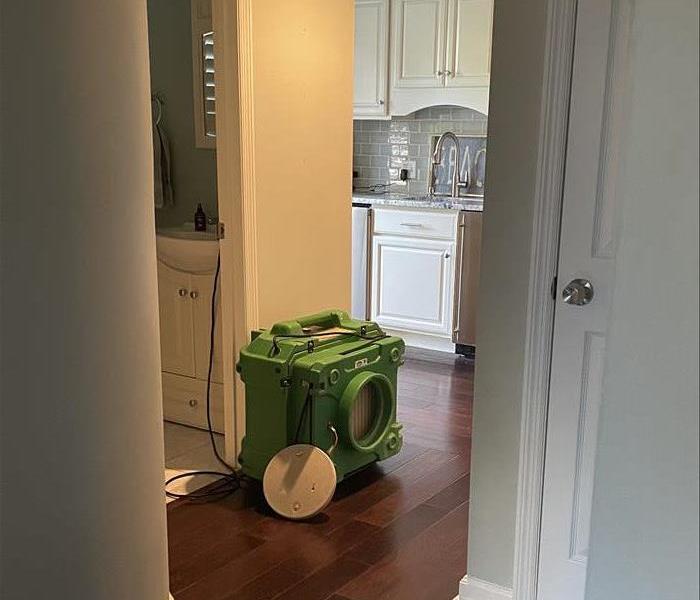 Let’s look at some ways to prevent candle fires and what to do if a candle does start a fire in your home.
Let’s look at some ways to prevent candle fires and what to do if a candle does start a fire in your home.
Candles add a cozy and relaxing feel to any home, but if not used carefully, they can also be a fire hazard. According to the U.S. Fire Association, candles are responsible for about 20 home fires every day.
Candles are great for setting the mood, but they come with risks. An open flame, even a small one, can quickly spread and cause major damage. Keeping safety in mind when using candles can help you avoid disaster.
Let’s look at some ways to prevent candle fires and what to do if a candle does start a fire in your home.
How to Prevent Candle Fires
- Don’t Leave Candles Unattended
A big mistake people make is leaving candles burning while they leave the room or go to bed. Always blow out the candle if you're leaving the area, even for just a short time. It’s not worth the risk to leave it unattended. - Use Proper Candle Holders
Make sure your candles are placed in sturdy, heat-resistant holders. These should sit on a stable surface where they won’t tip over. Keep candles away from anything that can catch fire like curtains, books, or furniture. - Keep Candles Away from Flammable Items
Candles should be at least 12 inches away from anything that can burn. This includes curtains, bedding, and decorations. Also, avoid placing candles near windows, as a draft could knock them over or blow a flammable object into the flame. - Trim the Wick
Before lighting a candle, trim the wick to about 1/4 inch. A shorter wick keeps the flame smaller and more controlled, reducing the chances of the candle burning unevenly or creating a larger flame. - Use Candles in Well-Ventilated Spaces
Make sure you’re burning candles in a room with good air circulation. This helps keep smoke from building up and reduces the risk of overheating. Also, avoid burning a candle down to the very end; leave about half an inch of wax to prevent overheating. - Try Flameless Candles
If you love the ambiance of candles but want to avoid the risks, flameless LED candles are a great alternative. They look just like real candles but don’t have an open flame, making them safer, especially if you have kids or pets.
What to Do If a Candle Fire Starts
If a candle fire does start, you’ll want to act quickly. Here are the steps you should follow:
- Smother the flames: Use baking soda or a fire extinguisher to put out small fires.
- Evacuate if needed: If the fire spreads, get everyone out of the house and call 911.
- Call for help: After the fire is out, call SERVPRO® for fire damage cleanup and restoration.
SERVPRO Is Here to Help®
If you experience a candle fire in your home, the aftermath can be overwhelming. SERVPRO of Berlin/Williamstown specializes in fire damage restoration and can help you get your home back to normal. We’ll even work with your insurance to make the process as easy as possible.
Safe and Proper Ash Disposal from Fireplaces and Wood Stoves
8/14/2024 (Permalink)
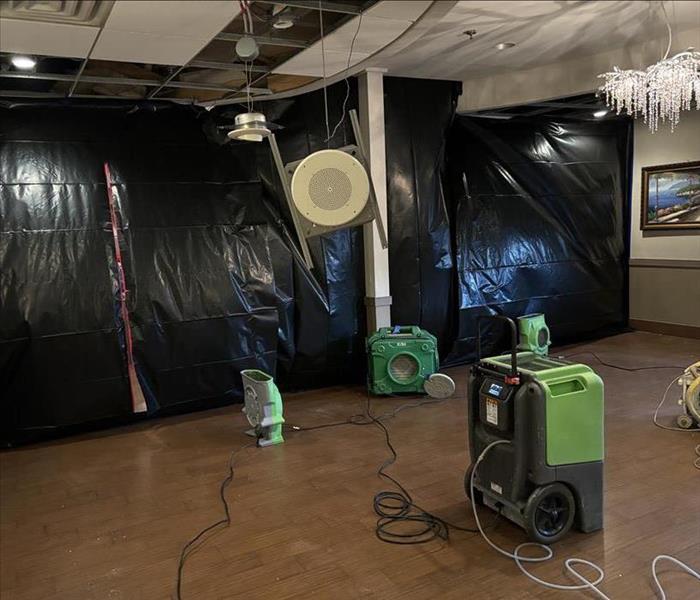 If you need assistance with fire damage restoration, contact SERVPRO of Berlin/Williamstown today!
If you need assistance with fire damage restoration, contact SERVPRO of Berlin/Williamstown today!
Using fireplaces and wood stoves can create a cozy atmosphere, but they also produce ashes that need to be disposed of safely. Improper ash disposal can lead to fire hazards and environmental issues. Here’s how to properly handle and dispose of ashes from your fireplace or wood stove.
Steps for Safe Ash Disposal
1. Let Ashes Cool Completely:
Before you start the disposal process, ensure that the ashes have completely cooled. Hot ashes can remain dangerous for several days. Wait at least 24 hours after the last fire before attempting to handle the ashes.
2. Use the Right Tools:
Always use a metal shovel and a metal container with a tight-fitting lid for ash removal. Avoid using plastic or cardboard containers, as these can easily catch fire if any hot embers are present.
3. Transfer Ashes Carefully:
When transferring ashes from the fireplace or wood stove to the metal container, do so slowly and carefully to avoid stirring up dust. Ensure the container is placed on a non-combustible surface, like concrete or stone, away from any flammable materials.
4. Store Ashes Safely:
Once the ashes are in the metal container, place the container outside and away from your home, garage, or any combustible materials. Keep it in a designated area where it won’t be disturbed by wind or animals.
5. Confirm Ashes Are Fully Cooled:
Allow the ashes to sit in the metal container for several days to ensure all embers are fully extinguished. Stir the ashes occasionally to help them cool down more quickly and evenly.
Environmentally Friendly Disposal Options
1. Use Ashes in Your Garden:
Wood ashes can be beneficial for your garden, providing nutrients like calcium and potassium. They can be used to raise the pH level of acidic soil. However, use them sparingly and avoid using ashes from treated wood or wood with chemicals.
2. Composting:
Ashes can be added to your compost pile in small amounts. They help neutralize acidity in the compost and add valuable minerals. Mix them thoroughly to ensure they integrate well with the other compost materials.
3. Ice and Snow Melt:
In winter, ashes can be spread on icy walkways and driveways as a natural and environmentally friendly way to provide traction and melt ice.
What Not to Do
1. Avoid Using a Vacuum Cleaner:
Never use a regular household vacuum cleaner to clean up ashes. Even if the ashes seem cool, there might be hot embers that can ignite a fire inside the vacuum.
2. Don’t Dump Ashes Directly Outdoors:
Avoid dumping ashes directly into the garden, lawn, or trash cans without proper cooling. Hot embers can ignite grass, leaves, or trash, leading to a potential fire hazard.
3. Do Not Use Ashes from Treated Wood:
Ashes from treated or painted wood should never be used in gardens or compost, as they may contain harmful chemicals that can damage plants and soil.
Proper disposal of ashes from fireplaces and wood stoves is essential for fire safety and environmental protection. By following these steps, you can safely manage ash disposal and even find beneficial uses for cooled ashes. Always prioritize safety and handle ashes with care to prevent potential hazards.
For more tips on fire safety and maintaining your home, or if you need assistance with fire damage restoration, contact SERVPRO of Berlin/Williamstown. Our team is here to help you keep your home safe and secure.
The importance of roof fireproofing
4/19/2024 (Permalink)
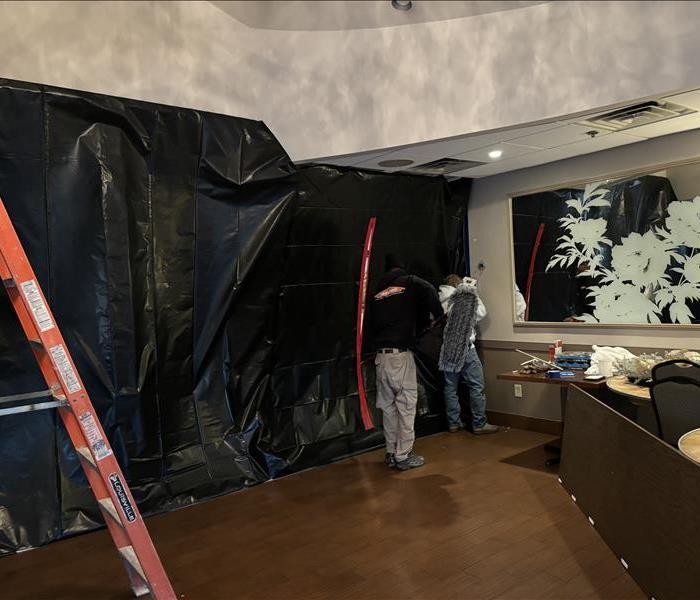 SERVPRO of Berlin/Williamstown is here to support you in protecting your home and assisting you with fire-related cleanup and restoration needs.
SERVPRO of Berlin/Williamstown is here to support you in protecting your home and assisting you with fire-related cleanup and restoration needs.
As a homeowner, ensuring the safety of your property should be a top priority. While many safety measures are taken inside the home, it's crucial not to overlook the importance of protecting your property from external threats, such as fires. One often underestimated but highly effective method is roof fireproofing.
Your roof is not only an integral part of your home's structural integrity, but it plays a vital role in safeguarding your property against various hazards, including fires. In this blog post, we'll delve into the reasons why roof fireproofing is essential and how SERVPRO® can help you fortify your home against potential disasters.
Preventing the Spread of Fire
Roof fires can quickly escalate and spread, causing extensive damage to your property. By investing in roof fireproofing measures, you create a barrier that can significantly slow down the progression of flames. This crucial time can be the difference between a manageable incident and a devastating disaster.
Enhancing Structural Integrity
A fire-damaged roof can compromise the structural integrity of your entire home. Fireproofing materials not only resist combustion but also strengthen the overall structure. SERVPRO offers advanced fire-resistant coatings and materials that add an extra layer of protection to your roof, ensuring it remains resilient in the face of potential threats.
Insurance Premiums and Property Value
Homes equipped with fire-resistant features, including roof fireproofing, often qualify for lower insurance premiums. Insurance providers recognize the reduced risk associated with fireproofed properties, leading to cost savings for homeowners. Additionally, fireproofing contributes to the overall value of your property, making it a wise investment for both safety and financial reasons.
Peace of Mind
Knowing that your home is fortified against the devastating effects of fires provides invaluable peace of mind. In the event of a fire, you can rest assured that your roof has an added layer of defense, giving you more time to evacuate and minimizing potential losses.
Why Choose SERVPRO for Roof Fireproofing
SERVPRO is a trusted leader in disaster recovery and restoration. Our team of experts is equipped with the latest technology and knowledge to assess your property's unique needs and provide tailored solutions. From fire-resistant coatings to advanced roofing materials, we offer a comprehensive range of services to ensure your home is well-protected.
Roof fireproofing is a proactive and effective measure to safeguard your home, family, and belongings from the destructive impact of fires. With SERVPRO as your partner in home protection, you can take confident steps toward fortifying your property and enjoying the peace of mind that comes with knowing you're prepared for the unexpected.
Strengthening Your Home's Armor: The Best Ways to Fireproof Your Roof
12/13/2023 (Permalink)
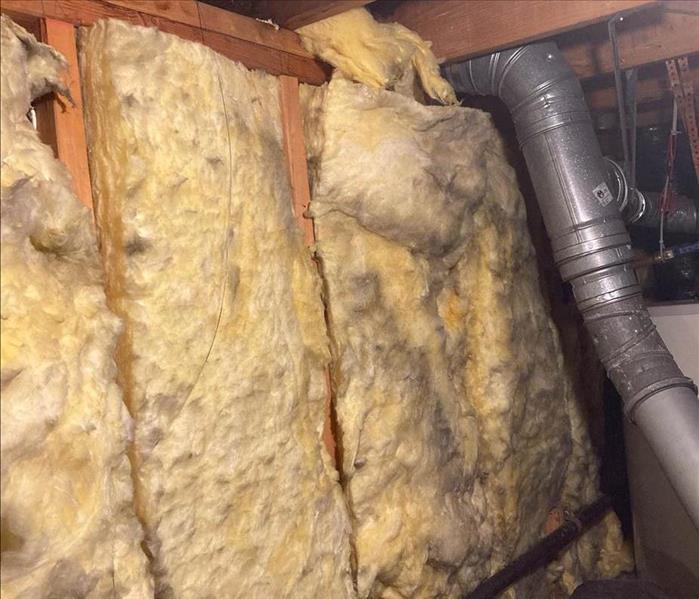 SERVPRO® of Berlin/Williamstown is here to support you in protecting your home and assisting you with fire-related cleanup and restoration needs.
SERVPRO® of Berlin/Williamstown is here to support you in protecting your home and assisting you with fire-related cleanup and restoration needs.
In today's blog, we'll delve into the essential topic of fireproofing your roof. Your roof is your home's primary defense against fire, and understanding how to fireproof it can make all the difference in protecting your property. Let's explore the top methods for fortifying your roof against the threat of fires.
Why Roof Fireproofing Is Crucial
Roof fireproofing is a proactive measure that can mean the difference between disaster and safety. Here's why it matters:
- Fire Safety: A fire-resistant roof can prevent flames from spreading into your home during a wildfire or from a neighboring property.
- Property Protection: Fireproofing your roof helps safeguard your home and valuable possessions, potentially saving you from costly repairs and replacements.
- Insurance Benefits: Many insurance companies offer discounts on homeowners' insurance for homes with fire-resistant roofing, making it a wise financial choice.
- Peace of Mind: A fireproof roof provides you and your family with an added layer of security, knowing you've taken steps to protect your home.
Top Ways to Fireproof Your Roof
- Choose Fire-Resistant Roofing Materials: Opt for Class A fire-rated roofing materials, which offer the highest level of fire resistance. Options include metal, concrete, and clay tiles.
- Apply Fire-Resistant Coatings: Fire-resistant coatings can be applied to existing roofs to enhance their fireproofing capabilities. These coatings serve as a barrier against flames.
- Maintain Your Roof: Regular roof maintenance is essential to ensure your fireproofing remains effective. Keep gutters clean, remove debris, and check for damaged or missing shingles.
- Install Ember-Resistant Venting: Use ember-resistant vents to prevent embers from entering your home through roof vents.
- Create Defensible Space: Keep trees and vegetation trimmed away from your roof and home. A clear, well-maintained space around your home can reduce the risk of a fire spreading to your roof.
- Seek Professional Guidance: Consult with roofing professionals experienced in fireproofing. They can assess your roof, recommend the best materials or coatings, and ensure that your home is well-protected.
Fireproofing your roof is a proactive step that offers significant advantages. By investing in fire-resistant roofing materials or coatings and staying diligent with maintenance, you're strengthening your home's defense against fire. Not only does it enhance the safety of your property and loved ones, but it can also lead to cost savings and peace of mind.
SERVPRO® of Berlin/Williamstown is here to support you in protecting your home and assisting you with fire-related cleanup and restoration needs. Remember that prevention is the best defense against fires, and roof fireproofing is a wise choice for homeowners who value security and peace of mind.
What to Throw Away After a Fire: A Comprehensive Guide
8/10/2023 (Permalink)
Experiencing a fire can be a devastating event, and once the flames are extinguished, the process of recovery and restoration begins. While it is natural to want to salvage as much as possible, there are certain items that should be thrown away after a fire to ensure safety and facilitate the restoration process. In this blog, we will provide you with a comprehensive guide on what items should be discarded and why.
Burned or Charred Items
Any items that have been burned or charred beyond recognition should be disposed of. These items are unlikely to be salvageable and can pose health hazards due to smoke residues, chemicals, or structural damage.
Perishable food that has been exposed to flames, smoke, or high heat should be discarded. Even if the packaging appears intact, the food may be contaminated and pose a health risk if consumed.
Opened or Damaged Food Products
Any food items that have been opened or damaged by fire, smoke, or water should be thrown away. Heat and smoke can compromise the integrity of packaging, potentially contaminating the contents.
Medications and cosmetics that have been exposed to fire, heat, or smoke should not be used and should be properly disposed of. These products can be dangerous when their composition has been altered or contaminated.
Fire-Damaged Appliances and Electronics
Appliances and electronics that have been directly affected by fire or intense heat should not be used and need to be discarded. Fire damage can compromise their electrical systems, posing a risk of malfunction or even electrical fires.
Furniture and upholstery that has suffered fire damage, such as charring, melting, or scorching, should be thrown away. These items can release harmful fumes and substances when burned or charred.
Smoke-Damaged documents
Paper documents and books that have been significantly smoke-damaged should be discarded. Smoke residues can infiltrate the pages and continue to release harmful substances, making them unsuitable for use or safe storage.
Items that have been exposed to prolonged water damage, such as excessive soaking or saturation, may become moldy or structurally compromised. These items should be thrown away to prevent further damage or health risks.
It is important to remember that safety should always be the top priority. If you have any doubts about the safety or suitability of any item after a fire, it is best to consult with professionals who specialize in fire damage restoration. They can guide you through the process of assessing and rectifying the damage, helping you make informed decisions about what should be thrown away and what can be salvaged. By following these guidelines, you can ensure a safer and more efficient recovery process after a fire.
Understanding Fire Sprinklers: How They Work and Why They're Important
5/10/2023 (Permalink)
As a property owner, it's important to understand the importance of fire sprinklers and how they work to protect your building and its occupants in case of a fire emergency. In this blog, we'll discuss the basics of fire sprinklers and why they're so crucial for fire safety.
How do fire sprinklers work?
Fire sprinklers are a key component of a building's fire suppression system. They work by releasing water when the temperature in the room reaches a certain level, usually around 155-165 degrees Fahrenheit. When the sprinkler head reaches this temperature, a small glass bulb within the sprinkler head breaks, allowing water to flow out and douse the flames.
Contrary to popular belief, fire sprinklers do not all activate at once, only the sprinkler head closest to the fire will be triggered. This means that a small fire can be extinguished quickly, preventing it from becoming a larger, more dangerous blaze.
Why are fire sprinklers important?
The main goal of a fire sprinkler system is to prevent the spread of fire, which can save lives and property. According to the National Fire Protection Association (NFPA), buildings with fire sprinkler systems experience an average of 60% fewer deaths and 70% fewer property losses than buildings without them. This highlights the importance of having a well-maintained fire sprinkler system in your building.
Another key benefit of fire sprinklers is that they can help to reduce the amount of water used by firefighters in the event of a fire. Since the sprinklers start working right away, firefighters may not need to use as much water to extinguish the fire. This can prevent water damage to your property and reduce the overall cost of repairs.
Maintaining Your Fire Sprinklers
To ensure that your fire sprinkler system is functioning properly, it's important to have it inspected and tested regularly. NFPA recommends that you have your system inspected by a licensed professional at least once a year.
During the inspection, the technician will check the water supply, the sprinkler heads, and the control valves to make sure that everything is in good working order. Any issues should be addressed immediately to prevent any potential problems during an emergency.
Fire sprinklers are an important part of any building's fire safety plan. They work by quickly extinguishing small fires, preventing them from spreading and causing more damage. They can also reduce the risk of injuries and fatalities during a fire. As a property owner, it's important to maintain your fire sprinkler system and have it inspected regularly to ensure that it's functioning properly. By doing so, you can help to keep your building and its occupants safe in the event of a fire emergency.
How to prevent a grease fire
2/10/2023 (Permalink)
Many people think they don't have to worry about grease fires because they're usually caused by cooking. Any items that contains grease can catch fire if it gets too hot, including candles and even your clothing dryer vent! So as we enter the warm weather months, take a minute to evaluate your home's safety and prepare yourself for something unexpected.
Grease fires are the most common fires.
Grease fires are one of the most common types of home fires. They usually start in the kitchen when you're cooking with oil and fat at high temperatures, but a house fire can also be caused from candles or clogged dryer vents.
Grease fires can happen anywhere there's fat drippings, mostly on your stovetop or inside your oven but could also happen on your outside grill.
Never underestimate a fire
It's easy to underestimate the power of a grease fire. They can cause a lot of property damage, much more than you might expect. And that's not to mention the injuries and fatalities caused by burns and smoke inhalation. A grease fire is just bigger and faster than it looks.
If you have an open flame or heat source near anything containing oil (like french fries), then there's always the potential for disaster, and fast! The flames from your stovetop may only be small at first, but as soon as they reach an open container of cooking oil or fat...BOOM! Your kitchen goes up in flames faster than you can say "I'm going to need some new cabinets."
Handling a Grease Fire
Don't panic. A quick, calm response will help you avoid or minimize damage from an out-of-control blaze. Don't try to put out the flames with water or other liquids (including baking soda). The water can cause splattering and spread the fire more quickly than it would otherwise have done so, making matters worse rather than better! Don't use any kind of metal pot lid--it won't do anything except make your pan harder to clean later on! Turn off the heat source. .If you're cooking on a stovetop, turn off the burner and remove any pots or pans from it. Leave immediately if possible. Let the firefighter handle the job.
What happens after SERVPRO is called?
Once you call SERVPRO, we will respond to your home. Our technicians have the training and equipment needed to put out a grease fire safely and effectively. If you are unable to put out a grease fire yourself, call 911 before calling SERVPRO of Berlin/Williamstown.
If you've never dealt with a grease fire before, or if it's been a while, it can be hard to know what to do. Maybe you're worried about ruining your dinner or favorite pan--or maybe you're worried about something worse! Fortunately, there are some easy ways to put out a grease fire that will give you the best chance of saving your meal and yourself. Give SERVPRO of Berlin/Williamstown a call at the first sign of fire damage in your home.
Stinky Microwave? Tips to Get It Clean
7/12/2022 (Permalink)
Homes in Clayton, NJ, with an over-the-range microwave, may appreciate the extra counter space, but it often means taking a little extra care of your appliances. Daily cooking can go up through the vent grill and create a smoke smell in the microwave. If a grease fire happens, the damage may require a professional fire and smoke damage remediation expert to remedy it. In most cases, that smell can be avoided with regular care and maintenance.
Keep It Clean
A good habit to form is to wipe down your microwave after each use. Food particles can quickly accumulate, which could affect how the appliance functions. The grease filter should also be removed and cleaned regularly. For an overall clean, common household items can be used to freshen them up.
Vinegar: Boiling a cup of water with a few tablespoons of vinegar for about four minutes can help loosen particles that have been crusted on. To remove grease, use one part vinegar and one part water and wipe out the unit.
Lemon Juice: The zesty lemon is a natural deodorizer. Use the same process as vinegar, but only use a few teaspoons of lemon. Fresh lemon slices can also be boiled in the water. Limes, oranges, and other citrus juice can also be used.
Baking Soda: For tough stains and smoke smell, this is a less acidic alternative. A water and baking soda solution, about one quart of water with five teaspoons of powder, can be used to wipe down the microwave. Use less water to create a paste for tougher stains.
Replacement Parts
Like with most things, there are components of a microwave that should be regularly replaced. Over-the-range models feature a charcoal filter. It is designed to absorb pollutants, including odors, and re-circulate air. If it can’t do its job right, your appliance can easily become smelly. It is recommended to replace filters every six months.
With just a little extra care, you can avoid a smoke smell in your kitchen and keep your appliances operating at their best.
3 Smart Smoke Detectors To Choose From
6/22/2022 (Permalink)
Smart Smoke Detectors
When you put together your fire safety plan for your Cedar Brook, NJ, home, you likely installed a smoke alarm in multiple places throughout your home. While a smoke detector is incredibly helpful in catching fire before it spreads out of control, it isn't quite as useful if a fire starts when you're not at home. Many fire remediation specialists recommend that you install smart alarms that will notify you in the event of a fire. Here are three smart smoke detectors to choose from.
1. Internet-Connected Smoke Alarm
Many home protection companies have started making internet-connected smoke alarms that notify you through push notifications on your phone if the alarm activates. Some alarms even contact local emergency services for you. These alarms can be a significant initial investment, depending on how big your home is and how many you need, but the peace of mind in knowing that your home is always protected is worth it.
2. Smart Batteries
If you don't want to purchase all new smoke alarms for your home, then use smart batteries. Instead of a regular 9-volt battery, you install the smart battery like normal and connect it to your Wi-Fi network. Then, if the alarm sounds or the battery runs low, you'll receive a notification on your phone. The battery only notifies you if the alarm it is installed in is triggered, so you'll have to buy a battery for each detector in your home to ensure complete coverage.
3. Listeners
Listeners are another excellent option if you don't want to replace all of the alarms in your home. The listener is plugged into the wall and listens for the specific frequency of the smoke alarm. Listeners are especially useful if you have a large home because you can place one device in a hallway, and it will cover every alarm on that floor.
You want to ensure your home is protected, even while you're not there. Smart smoke alarms will give you peace of mind and are a great way to catch fires before they grow out of control.
3 Convenient Ways To Remove Burnt Smells From Your Microwave
4/7/2022 (Permalink)
3 Easy Ways To Get Rid Of Burnt Smells In Your Microwave
Whether you misread the label or just pressed the wrong time, you've probably ended up with a smoke smell in your trusted microwave at some point. The good news is that you can remove this with little hassle. Here are three convenient ways to remove burnt smells from your appliance.
1. Steam and Clean It
A strong defense is steaming and cleaning it. This is quick, easy, and can provide similar results as hiring a fire remediation company. To use this method, heat a bowl of water in your appliance for about three minutes. The steam should loosen the grime. Wipe the inside with a soapy rag. If you have a stainless steel interior, be sure to rub gently to avoid scratches. Then, dry the inside with a towel. It is a good idea to leave the door open so that it can air out inside your home in Clayton, NJ.
2. Use a DIY Solution
A smoke smell caused by plastic or fish may require
additional help. This is similar to the steam and clean method, but it involves adding some natural cleaners. Mix a tablespoon of vinegar or lemon juice into a cup of water. If you can't stand the smell of these products, you can find another natural cleaner. Vanilla extract or coffee grounds are the next best options. Heat the liquid for about two minutes. Wipe the grime off the inside with a sponge.
3. Deodorize It Overnight
When a severe smoke smell gets trapped in the tiny vents in your appliance, you need a tougher solution to remove it. This means it is time to use an overnight method. Use this technique by placing baking soda in your appliance before going to bed and letting it work.
Whether you have a severe smell trapped in your vent grill or something lighter, you can remove it using one of these hassle-free solutions. Any of these are a good option for removing tough smells.
Does Homeowners Insurance Cover Every Type of Fire?
2/4/2022 (Permalink)
Is Every Type of Fire Covered by Homeowners Insurance?
Different types of fires may or may not be covered by homeowners insurance. Most accidental fires and even some fires for which liability is a factor are covered perils. The legal term for an intentional home fire is arson. These fires are not covered by insurance and may result in criminal penalties. Find out more about the fire coverage available through most homeowners insurance policies.
Accidental Fires
Most homeowners insurance policies cover accidental fires. Several features distinguish this type of fire:
- May be caused by an electrical short or heating malfunction
- Could result from the actions of a policyholder or another person
- No intention to destroy
An investigation will probably be necessary before an insurer will cover restoration costs. The one exception to this general coverage is a vacant home fire. Policyholders should obtain an endorsement or an additional vacancy policy for a vacation home or residence that will not be occupied for more than 30 consecutive days.
Fire Liability
Some fires start due to gross negligence or casual disregard on the part of a policyholder or another occupant of a residence. These fires may or may not be covered, depending on how the home fire started and whether any evidence of intentionality is present.
Intentional Fires
Insurance does not cover fires started deliberately to harm a person, damage property, or commit insurance fraud. Intentionally starting a fire may result in one or more of the following criminal charges:
- Arson
- Criminal mischief
- Destruction of property
- Reckless burning
Investigators will search for indications of intent to destroy property. An intentional fire may result in a prison sentence.
Most accidental fires and even some fires in which liability is evident should be covered by homeowners insurance. Intentional fires or fires in vacant properties without sufficient coverage are not covered. Insurers prefer to work with home fire damage restoration experts in Clementon, NJ.
Commercial Property Fire: 4 Steps to Take After a Disaster
1/3/2022 (Permalink)
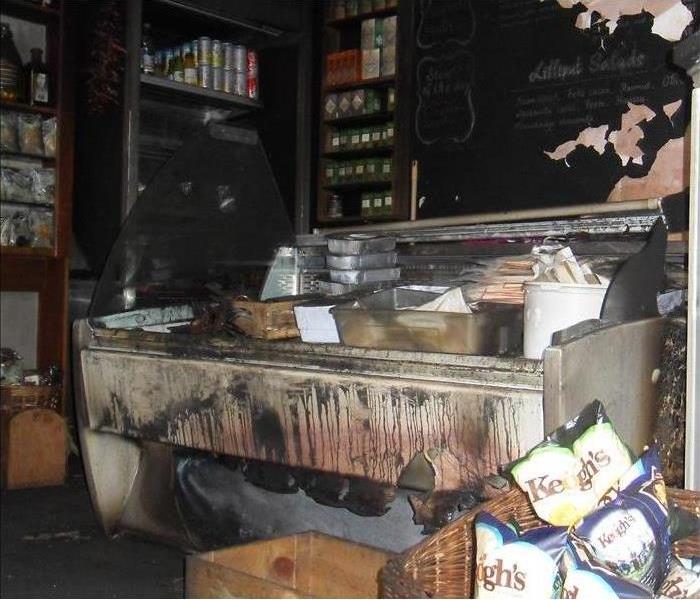 Twenty-four-seven, three hundred and sixty-five days, SERVPRO is ready to assist you in any fire, water, mold, or storm loss. Call us!
Twenty-four-seven, three hundred and sixty-five days, SERVPRO is ready to assist you in any fire, water, mold, or storm loss. Call us!
Four Steps To Take After A Commercial Property Fire
Fire restoration is usually the first thing that comes to mind when property owners consider potential fire loss. However, there is a basic set of rules to follow immediately following a fire, and restoration is the last on that list.
1. Ensure Employees or Tenants are Safe
Safety should always be the top priority. Therefore, you should make sure that all of your employees or tenants are safe and accounted for. You can set up an emergency management team that is responsible for a set number of employees, making it their responsibility to count or contact every employee to ensure their safety.
2. Call Your Insurer
Once you know everyone is safe, you should reach out to your property or fire insurance provider. Fire restoration coverage depends on the adjuster’s assessment of the property and the cause of the fire, and it is vital to get this process moving as soon as possible to reduce business interruption.
3. Make a Record of Loss
Once you have contacted your insurer, you can begin making a photographic record of the property loss. You should go from room to room taking as many pictures as necessary to show the adjuster. Additionally, you may want to gather any relevant receipts and pair each with the corresponding items in the photographs.
4. Call a Restoration Specialist
Lastly, to mitigate further loss and to begin the fire and smoke cleaning process, you may want to call a disaster restoration specialist in the Williamstown, NJ, area. While your insurer may require several estimates, it is essential to find a restoration company sooner rather than later to minimize further damage.
Fire restoration is part of the aftermath of a fire, but it is not the first step. Safety is paramount followed by contacting your insurer and making a record of loss. Only after these steps are taken care of, should you reach out to a restoration specialist and begin remediation.
How Do House Fires Typically Start?
12/2/2021 (Permalink)
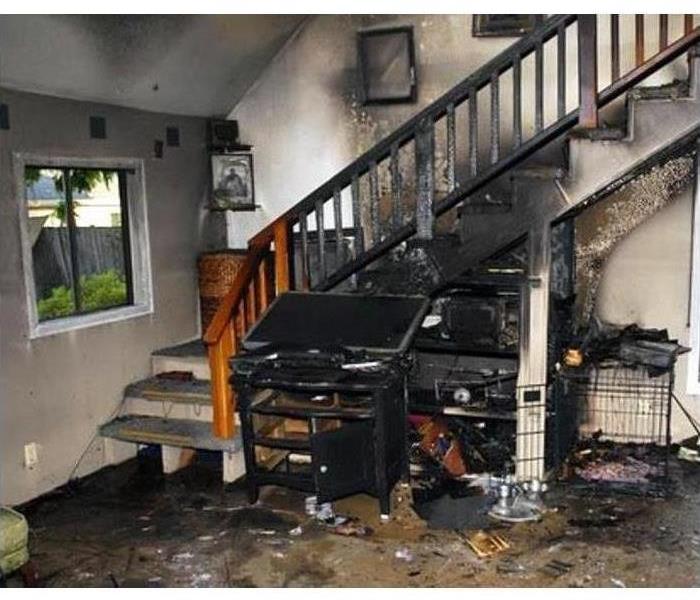 SERVPRO has the experience to handle any fire damage in your commercial property and we're available 24/7 to answer your call.
SERVPRO has the experience to handle any fire damage in your commercial property and we're available 24/7 to answer your call.
How Do Most House Fires Begin?
It’s a nightmare scenario that no homeowner wants to think about: a house fire causing major damage or harm. The effects of a home fire can be devastating and even deadly. Fortunately, there are ways you can help prevent these awful situations in your Clementon, NJ, house. When you understand some of the leading residential fire causes, you can take appropriate measures to keep you and your family safe.
Electrical Fires
You rely on electricity in your house every day of your life. It powers your appliances, your computers and forms of entertainment. It’s hard to imagine living without this convenience. However, electrical issues can also start fires. Here are some typical ways this occurs:
- Plugging in too many cords in one outlet
- Faulty wiring or faulty fuse boxes
- Old, outdated appliances
- Overheated space heaters
Smoking
If you smoke, take great care to dispose of cigarettes or cigars properly. Better yet, smoke outdoors away from your home and away from brush. Cigarette butts and ash can easily fall onto carpet, furniture, paper and other items. Once a home fire starts, it can spread quickly. If you choose to smoke indoors, use an ashtray and never leave a lit cigarette unattended.
Cooking
Many fires begin in the kitchen over a hot stove or in an oven. Not only can these issues lead to expensive fire cleaning, but they can cause extensive damage. Often, people will let pans get too hot or may even leave a stove or oven on. Keep a close eye on cookware when you’re baking or cooking, especially if grease is involved.
Candles
People love scented and other types of candles for the ambiance they can create. Regrettably, they’re also culprits for fires at home. If you light candles, keep them away from flammable materials.
Any of these problems could arise in your house and cause a home fire. While a restoration team can help clean up the damage, it’s better to know the causes of fires and avoid them altogether.
 Let’s look at some ways to prevent candle fires and what to do if a candle does start a fire in your home.
Let’s look at some ways to prevent candle fires and what to do if a candle does start a fire in your home.




 24/7 Emergency Service
24/7 Emergency Service




